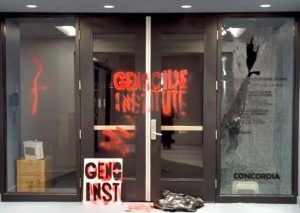MONTREAL – Although some chassidic and other haredi schools are making progress in conforming to the law, at least two continue to fail to meet minimal requirements, according to a report to the Quebec education ministry by its advisory group on private education.
The 2014-2015 annual report of the Commission consultative de l’enseignement privé (CCEP), made public in May, cites the most serious problems with Beth Esther Academy and Yeshiva Gedola Merkaz Hatorah.
The CCEP recommended that Beth Esther’s permit, which was revoked in 2012, not be reissued.
However, despite pressure from the Parti Québécois and Coalition Avenir Québec, Education Minister Sébastien Proulx has decided to allow Beth Esther and Yeshiva Gedola to continue to operate, because it is “in the interest of the children.” The government, he said in the National Assembly, will continue to work with the schools to correct the situation.
His ministry rejected the recommendation of the CCEP and renewed Yeshiva Gedola’s permit for another year, which ends this June.
READ: NEW HEBREW U PROGRAMS TARGET DISABILITY, HAREDI ISSUES
Among other breaches, the CCEP said the Satmar elementary and high school for girls is not adequately teaching the province’s compulsory curriculum, known as the Régime pédagogique, in terms of either content or hours, and its teachers are unqualified.
After operating for decades under the radar, the school, founded in 1956, was told in 2003 it had to have a permit, and four years later was granted one on the condition it rectify numerous problems that the ministry identified.
In 2014-2015, Beth Esther had 304 students and 24 teachers, of whom only two held a licence recognized by Quebec.
Satmar community leader Alex Werzberger, whose daughters attended Beth Esther, told The CJN the school has tried and continues to try to meet the law’s requirements, but Chassidim will not compromise their religious beliefs. This means they won’t teach certain subjects, such as the mandatory Ethics and Religious Culture course (ERC) or sex education, or even certain literature or scientific theories.
“There’s no way that’s going to happen. If worse comes to worst, we’ll move to the [United] States,” he said
As for the teachers’ lack of credentials, Werzberger said: “They come from our own community. They have not gone to college, but they know English, French, math and so on. They probably know more than those who are certified.”
He believes, though, that Beth Esther is now devoting the required number of hours to secular studies.
The CCEP recommended that Yeshiva Gedola’s request to renew its permit and government funding be rejected. Since 2008, the boys’ school has had its permit renewed for two years and then just annually on the condition it become compliant. But although some improvements were made, Yeshiva Gedola was still not devoting enough time to compulsory subjects, according to the CCEP.
Efforts to reach Yeshiva Gedola president David Rothschild for comment were unsuccessful.
Yeshiva Gedola is one of five chassidic or haredi schools that reached an agreement with the Minister of Education in 2009 to be in line with the law by the 2012-2013 academic year.
Other schools in that group of five have shown sufficient progress in the CCEP’s estimation to have their permits and funding renewed.
Belz Community School, which opened in 1959, had its permit renewed for one more year, again on condition that it continues efforts to satisfy the education department.
Among recurring problems is that about one-third of its 49 teachers are not legally qualified.
The CCEP also found that the mandatory Ethics and Religious Culture (ERC) course, which offers an overview of the major religions, was not being taught, and that boys’ education was below the minimum number of hours.
First Mesifta School of Canada has made more progress, and the CCEP recommended its permit and subsidies be renewed for two years.
While instruction has improved considerably and the majority of teachers are now qualified, the CCEP noted the ERC is not being taught.
Skver Community Schools, another in the group of five, also had its permit and subsidies renewed for two years – a show of confidence after having been renewed only on an annual basis for some years. There was an issue with the ERC here, too: it was not being taught in its entirety. The commission was also concerned about a deficit the school has run.
READ: QUEBEC ABANDONS CRITICIZED HATE-SPEECH BILL
Among other Orthodox Jewish schools whose files came before the CCEP in 2014-2015 was Beth Jacob School, a girls’ school, which had its permit renewed for three years, with a commendation for its ongoing progress toward meeting all regulations, as did Académie Yéshiva Yavné.
The highest commendation to a Jewish school went to Hebrew Academy and Hebrew Foundation School, which each had its permits and funding renewed for the maximum five years.
Solomon Schechter Academy was renewed for four years.
The two largest Jewish day schools, Jewish People’s and Peretz Schools/Bialik High School and Talmud Torah/Herzliah High School, had their permits renewed for three years.
The CCEP noted some financial issues both had been experiencing.
Among the nine members of the commission is Félix Méloul, a former executive director of the Association of Jewish Day Schools.






